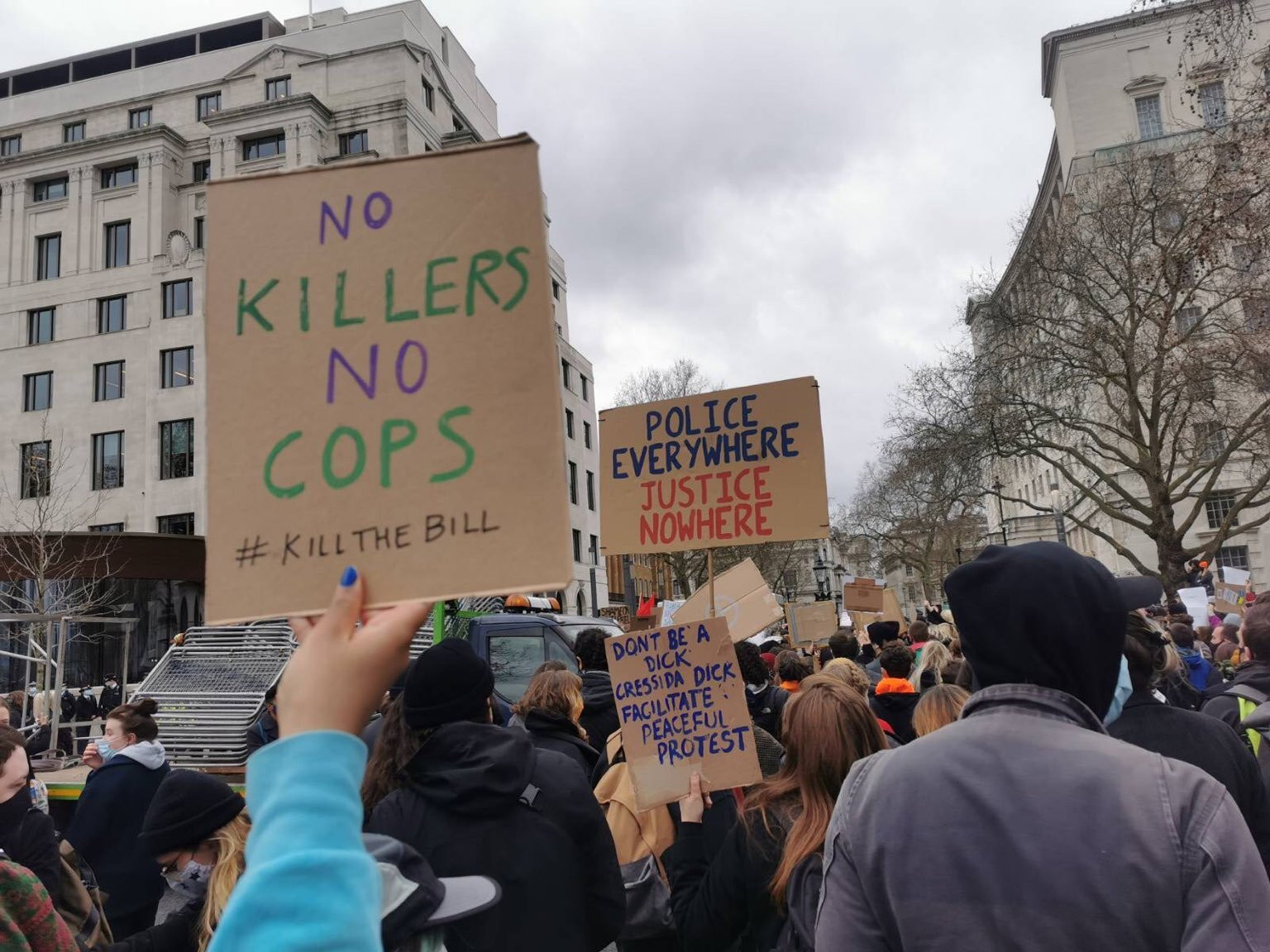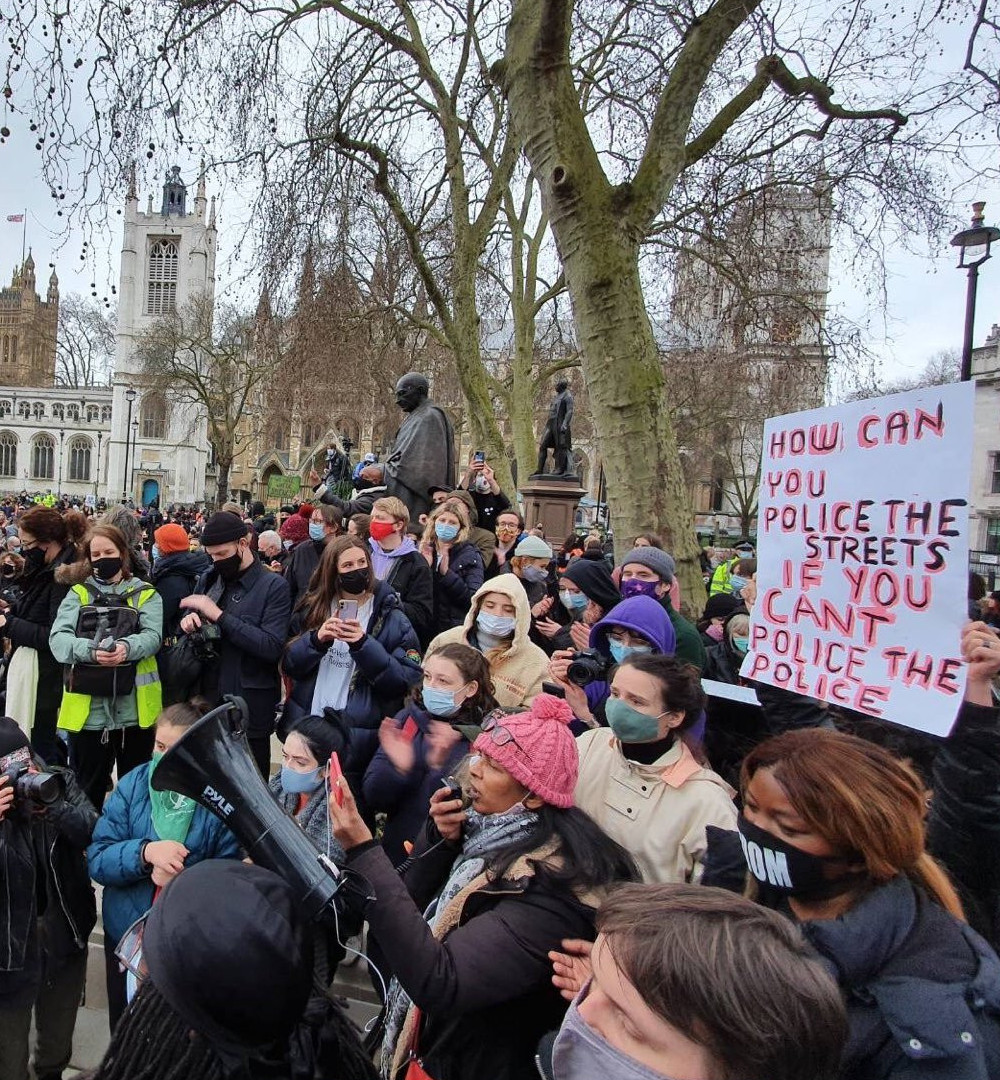Why women are protesting: 'Kill the bill. No more police powers, we will not be silenced!’
Thousands marched in London over Bank Holiday weekend, the latest and largest demonstration against a bill which will hand police more powers to shut down protests. We ask why is the anti-protest bill generating so much anger and controversy?


Celebrity news, beauty, fashion advice, and fascinating features, delivered straight to your inbox!
You are now subscribed
Your newsletter sign-up was successful
Thousands marched in London over Bank Holiday weekend, the latest and largest demonstration against a bill which will hand police more powers to shut down protests. We ask why is the anti-protest bill generating so much anger and controversy?
You've seen the headlines and the images as thousands marched in Central London and gathered from noon on Saturday in Trafalgar Square and The Mall, many wearing masks and waving placards emblazoned, “Kill the bill”, "Say no to UK police state” and “Freedom to protest is fundamental to democracy”. As the day progressed, Extinction Rebellion - just one of the groups The Police, Crime, Sentencing and Courts Bill is said to be targeting - staged 'protest of one' roadblocks and other demonstrators headed towards the Home Office where police say nine people were arrested. Meanwhile similar protests were held in Manchester, Sheffield, Newcastle and Bristol.
Kill The Police Bill
Anxiety was running high in Bristol following previous clashes between demonstrators and police earlier this year, where a peaceful sit-down protest escalated to the point where riot police, dogs and police horses were deployed and police station windows smashed. Demonstrators, surrounded by riot officers and mounted police, chanted “10 years for protests, five years for rape”. Seven people were arrested and twenty police officers reported injured. This weekend, police reported two arrests and 13 officers assaulted.
As is apparent from the headlines, things turned violent in the latest demonstrations against the Police, Crime, Sentencing and Courts Bill and concerns are mounting similar protests and scenes will continue to ignite across the UK. So why is The Police Bill provoking so much anger and controversy? Because the bill proposes to allow police in England and Wales more power to impose conditions on non-violent protests, and in short anything considered 'too noisy' or a 'nuisance' could see peaceful protesters potentially facing fines or prison sentences. Hence, tensions are running very high as many believe the police bill is attacking human rights and civil liberties. Protesters say the bill is ill thought out, a restriction on freedom of expression and the right to peaceful protests.

The bill originally came under forensic scrutiny in the wake of the Met Police handling of the Sarah Everard vigil. In response to the news that the bill passed its second reading on Tuesday March 16 with 359-263 votes, thousands of protesters remained undeterred: "This is just the beginning. It’s our duty to fight for our freedom," says Rosa Silvere from Sisters Uncut, a feminist activist group against government cuts in domestic violence services. “As the actions of police at peaceful vigils show, police clearly abuse the powers that they already have - and yet the government plans to give them more powers in the police bill.”
Sisters Uncut are not alone, more than 150 groups, including human rights charities, unions and faith communities, are warning the bill would have a hugely detrimental effect on civil liberties in England and Wales. Critics have also pointed out that the 10-year maximum jail term introduced under the bill for people who criminally damage a statue is more than many men get for sexually assaulting or raping a woman.
Since the scenes at the Clapham Common vigil for murdered Sarah Everard, the four consecutive day of protests for Sarah and against the bill in central London included a coalition of grassroots groups such as domestic violence support centre Sistah Space, BLM, Women's Strike Assembly, Gypsy, Roma and Traveller Activists, Women Against Rape, Good Night Out, and many more.
Celebrity news, beauty, fashion advice, and fascinating features, delivered straight to your inbox!
'They're voting against our right to protest'
In Parliament Square on Tuesday March 16, a speaker from human rights campaign group Liberty said: "We are here today because the government wants to pit us against one another, to criminalise our right to dissent, to challenge when we dare to stand up to power. They are voting against our right to protest, they are telling us that objection to oppression is worse than the oppression itself. But protest is a fundamental human right, not a gift that the state can take or give away as a gift at its pleasing. We demand the right to take to the streets. We demand the rights to organise together. We demand the right to be out at night. We are here, we are together, and we are not afraid."
Then before the bill’s second reading was passed, Sisters Uncut laid 194 bunches of flowers outside Parliament spelling out "Kill the Bill," commemorating the 194 women killed by police and prison violence since 2010. Speakers referenced police at Clapham Common on Saturday who ignored sexual harassment of women protesters, spoke about the dehumanising photos taken by police of Nicole Smallman and Bibaa Henry after their deaths, and invoked the names of Black people who died at the hands of police. Members of Sistah Space, a Black-led domestic violence support centre, said, "This is for Sarah, for Sandra Bland, for Breonna Taylor, for Nicole and Bibaa. If you see a Black woman arrested, get involved."
“The death of Sarah Everard must be seen in context of the structures of violence against women in this country,” says Silvere. “This includes the police who brutally manhandled grieving women at the vigil, the members of the police who last summer took photos of the dead bodies of two Black women, Bibaa Henry and Nicole Smallman and the routine failures of the police to investigate rape cases as well as their own record of domestic abuse against women. Moreover in 2019, a Bureau of Investigative Journalism report found that police are treated differently in abuse cases. For police, 3.9% in England and Wales ended in a conviction, compared with 6.2% among the general population.”
Silvere voiced her concerns about institutional misogyny in the police force which has been increasingly gaining traction and headlines. “While there may well be individual police officers who are horrified by all of this,” Silver says. “The fact of the matter is that there is an institutionally engrained, deeply entrenched racist misogyny that runs rampant through the whole criminal legal system.”
So what is the Police, Crime, Sentencing and Courts Bill?
The government says the bill will give the police powers to protect themselves and the public, introduce tougher sentencing and improve the efficiency of the court and tribunal system. However, Sisters Uncut claim giving the police more power, will lead to an increase in the number of survivors being arrested, especially black and minority ethnic and poorer survivors. The group proposes that the bill will re-introducing measures such as a 'digital stripsearch' of the phones of survivors of gendered violence who report to the police. And they claim it will give police more powers to enact sweeping new stop and search powers, to increase surveillance and to criminalise Traveller communities.
Why change in the law on protesting now?
It’s probably no coincidence that the home secretary is on record being very critical of the actions of protest groups such as Extinction Rebellion and the Black Lives Matter marches. She described XR as “so-called eco-crusaders turned criminals” and once called the BLM protests “dreadful”. The Metropolitan Police’s cost for policing XR’s 2019 London protests was reportedly more than £16m.
Many government ministers also believe existing public order legislation, passed in 1986, is no longer fit for purpose when managing protests. The government is claiming the measures will not undermine freedom of expression but “balance the rights of protesters with the rights of others to go about their business unhindered”.
What about my right to protest?
This is a crucial and important point, Sisters Uncut claim it will give police more power to decide where, when and how citizens are allowed to protest. The police already have power to impose conditions on marches, such as start and finish times, but this bill will allow them to impose conditions on static protests too. They will also have powers to impose maximum noise limits on protests and to intervene if any noise is affecting the “activities of an organisation” or has a “relevant impact on persons in the vicinity”.
Crucially the bill will also let the home secretary, Priti Patel, have the power to create laws, without parliamentary approval, defining ‘serious disruption’ to communities and organisations. In short, if the bill becomes law it can mean the end of protests outside the Houses of Parliament for various ‘access’ reasons. In fact, it could signal the end to all peaceful protests and marches.
What critics say
Sisters Uncut say the bill will empower police to decide where, when and how citizens are allowed to protest and have their voices heard by those in power. It will also increase penalties for those breaching police conditions on protests. The right to protest is essential for all people, and especially survivors of violence, to hold powerful institutions accountable and must be protected. Silvere says: "The bill is rotten to its core. This bill doesn't need amendments, it needs to be scrapped in its entirety."
Maria Coole is a contributing editor on Marie Claire.
Hello Marie Claire readers – you have reached your daily destination. I really hope you’re enjoying our reads and I'm very interested to know what you shared, liked and didn’t like (gah, it happens) by emailing me at: maria.coole@freelance.ti-media.com
But if you fancy finding out who you’re venting to then let me tell you I’m the one on the team that remembers the Spice Girls the first time round. I confidently predicted they’d be a one-hit wonder in the pages of Bliss magazine where I was deputy editor through the second half of the 90s. Having soundly killed any career ambitions in music journalism I’ve managed to keep myself in glow-boosting moisturisers and theatre tickets with a centuries-spanning career in journalism.
Yes, predating t’internet, when 'I’ll fax you' was grunted down a phone with a cord attached to it; when Glastonbury was still accessible by casually going under or over a flimsy fence; when gatecrashing a Foo Fighters aftershow party was easy-peasy-lemon-squeezy and tapping Dave Grohl on the shoulder was... oh sorry I like to ramble.
Originally born and bred in that there Welsh seaside town kindly given a new lease of life by Gavin & Stacey, I started out as a junior writer for the Girl Guides and eventually earned enough Brownie points to move on and have a blast as deputy editor of Bliss, New Woman and editor of People newspaper magazine. I was on the launch team of Look in 2007 - where I stuck around as deputy editor and acting editor for almost ten years - shaping a magazine and website at the forefront of body positivity, mental wellbeing and empowering features. More recently, I’ve been Closer executive editor, assistant editor at the Financial Times’s How To Spend It (yes thanks, no probs with that life skill) and now I’m making my inner fangirl’s dream come true by working on this agenda-setting brand, the one that inspired me to become a journalist when Marie Claire launched back in 1988.
I’m a theatre addict, lover of Marvel franchises, most hard cheeses, all types of trees, half-price Itsu, cats, Dr Who, cherry tomatoes, Curly-Wurly, cats, blueberries, cats, boiled eggs, cats, maxi dresses, cats, Adidas shelltops, cats and their kittens. I’ve never knowingly operated any household white goods and once served Ripples as a main course. And finally, always remember what the late great Nora Ephron said, ‘Everything is copy.’
